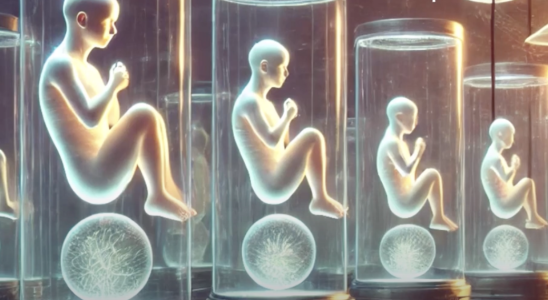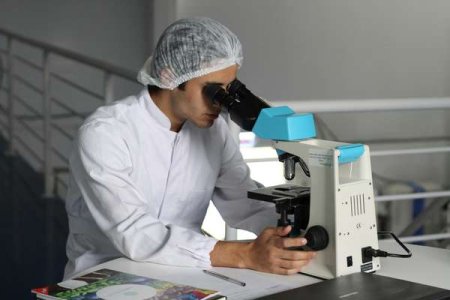The stork’s off duty—Science is growing its own…humans?
- Replies 0
In a revelation that seems ripped from the pages of a science fiction novel, a group of pioneering scientists has introduced a concept that could forever alter the landscape of medicine and ethics.
Would you be open to the idea of artificial humans? Yes, you read that right. Soulless humans may roam the same Earth that we do.
But as we stand on the precipice of this brave new world, questions abound: Are we ready for the implications of such a creation?
A group of scientists proposed the creation of “bodyoids,” essentially spare human bodies grown in artificial wombs, which could be used for medical experiments, organ transplants, and even as a source of “ethical meat.”
The term “bodyoid” may sound like something out of a dystopian future, but it's a very real proposition put forth by scientists Carsten T. Charlesworth, Henry T. Greely, and Hiromitsu Nakauchi.
Their work, detailed in the MIT Technology Review, paints a picture of a future where human bodies are grown without consciousness, designed to endure without experiencing pain.
These bodyoids would be cultivated using pluripotent stem cells, which are among the earliest cells to develop in human embryos.

These cells have the remarkable ability to differentiate into any cell type, making them the perfect building blocks for this ambitious project.
The researchers have already made strides in creating structures that resemble human embryos, and the next step is to grow these entities entirely outside of the human body in artificial uteruses.
The scientists' plan hinges on “genetic technique” that would inhibit brain development, ensuring that these bodies never achieve sentience.
The goal is to create a new resource for medical research—one that could sidestep the ethical conflicts associated with animal testing and the suffering it entails. These zombie-like bodies could be used to test out new medicine and growing human organs for transplants.
The potential applications for bodyoids are vast. They could revolutionize the way we approach organ transplants, addressing the dire shortages that leave over 100,000 Americans in limbo, waiting for life-saving procedures.
Medical students could also benefit from these developments, as bodyoids might one day replace the need for donated cadavers in educational settings.
The researchers also aim to grow fetuses entirely outside the body using artificial uteruses, which is already undergoing testing.
However, the proposal is not without its moral mazes. The idea of growing human bodies for parts or consumption treads into uncharted ethical territory.

The researchers acknowledge the myriad of questions their plan raises, but they emphasize the transformative possibilities that could emerge from the development of bodyoids.
The scientists argue that the current reliance on animal testing is not only cruel but also inefficient, as the results do not always translate well to human treatments.
They also argued that many medical treatments currently require testing on live human participants in clinical trials — a process that not only "risks harm to patients" but also "can take a decade or longer to complete."
They point out that the vast majority of drugs tested on animals fail to clear the hurdles necessary for human use. Additionally, testing possibly tortures the creates since they’re sentient and feel pain.
Also read: Red tides no longer a mystery as scientists uncover a surprising source behind Florida’s crimson waves
By using bodyoids, researchers could potentially streamline the drug development process, reducing the time and risk involved in bringing new medications to market.
According to the researchers, once developed, these synthetic bodies "could help resolve several ethical challenges in modern medicine by providing alternatives that reduce unnecessary pain and suffering."
One such challenge, they noted, includes the pursuit of more "ethical meat" sources. They also added, "For example, they could offer an ethical alternative to the way we currently use nonhuman animals for research and food, providing meat or other products with no animal suffering or awareness."
They noted that only about 15% of clinical trials actually lead to successful outcomes.
In highlighting the urgency of their research, the scientists pointed to a troubling statistic: over 100,000 Americans are currently waiting for solid organ transplants, a crisis they say shows no signs of slowing.
They also emphasized the critical role that donated human bodies play in training future medical professionals — a resource that remains limited.
Concluding their provocative essay, the scientists made an urgent call to begin testing on rodents as a next step in advancing their research.
The scientists behind the bodyoid concept are urging the scientific community to begin experiments, starting with rodent models, to explore the feasibility of their ideas.
They believe that what was once the domain of speculative fiction is now within the realm of possibility—and could be revolutionary.
Read next: Scientists created furry mice: Are woolly mammoths roaming the Earth again?

How do you feel about the creation of bodyoids? Do the potential benefits in medical research outweigh the ethical concerns? Could this be a solution to the organ transplant crisis? We encourage you to share your thoughts and engage with us in the comments below!
Would you be open to the idea of artificial humans? Yes, you read that right. Soulless humans may roam the same Earth that we do.
But as we stand on the precipice of this brave new world, questions abound: Are we ready for the implications of such a creation?
A group of scientists proposed the creation of “bodyoids,” essentially spare human bodies grown in artificial wombs, which could be used for medical experiments, organ transplants, and even as a source of “ethical meat.”
The term “bodyoid” may sound like something out of a dystopian future, but it's a very real proposition put forth by scientists Carsten T. Charlesworth, Henry T. Greely, and Hiromitsu Nakauchi.
Their work, detailed in the MIT Technology Review, paints a picture of a future where human bodies are grown without consciousness, designed to endure without experiencing pain.
These bodyoids would be cultivated using pluripotent stem cells, which are among the earliest cells to develop in human embryos.

Cutting-edge scientists have proposed a plan to grow “spare” human bodies in artificial wombs, calling them “bodyoids”. Image source: Uncharted Territories / Youtube.
These cells have the remarkable ability to differentiate into any cell type, making them the perfect building blocks for this ambitious project.
The researchers have already made strides in creating structures that resemble human embryos, and the next step is to grow these entities entirely outside of the human body in artificial uteruses.
The scientists' plan hinges on “genetic technique” that would inhibit brain development, ensuring that these bodies never achieve sentience.
The goal is to create a new resource for medical research—one that could sidestep the ethical conflicts associated with animal testing and the suffering it entails. These zombie-like bodies could be used to test out new medicine and growing human organs for transplants.
The potential applications for bodyoids are vast. They could revolutionize the way we approach organ transplants, addressing the dire shortages that leave over 100,000 Americans in limbo, waiting for life-saving procedures.
Medical students could also benefit from these developments, as bodyoids might one day replace the need for donated cadavers in educational settings.
The researchers also aim to grow fetuses entirely outside the body using artificial uteruses, which is already undergoing testing.
However, the proposal is not without its moral mazes. The idea of growing human bodies for parts or consumption treads into uncharted ethical territory.

The proposal raises significant ethical questions and considerations about the potential misuse of such technology. Image source: Pixabay / Pexels.
The researchers acknowledge the myriad of questions their plan raises, but they emphasize the transformative possibilities that could emerge from the development of bodyoids.
The scientists argue that the current reliance on animal testing is not only cruel but also inefficient, as the results do not always translate well to human treatments.
They also argued that many medical treatments currently require testing on live human participants in clinical trials — a process that not only "risks harm to patients" but also "can take a decade or longer to complete."
They point out that the vast majority of drugs tested on animals fail to clear the hurdles necessary for human use. Additionally, testing possibly tortures the creates since they’re sentient and feel pain.
Also read: Red tides no longer a mystery as scientists uncover a surprising source behind Florida’s crimson waves
By using bodyoids, researchers could potentially streamline the drug development process, reducing the time and risk involved in bringing new medications to market.
According to the researchers, once developed, these synthetic bodies "could help resolve several ethical challenges in modern medicine by providing alternatives that reduce unnecessary pain and suffering."
One such challenge, they noted, includes the pursuit of more "ethical meat" sources. They also added, "For example, they could offer an ethical alternative to the way we currently use nonhuman animals for research and food, providing meat or other products with no animal suffering or awareness."
They noted that only about 15% of clinical trials actually lead to successful outcomes.
In highlighting the urgency of their research, the scientists pointed to a troubling statistic: over 100,000 Americans are currently waiting for solid organ transplants, a crisis they say shows no signs of slowing.
They also emphasized the critical role that donated human bodies play in training future medical professionals — a resource that remains limited.
Concluding their provocative essay, the scientists made an urgent call to begin testing on rodents as a next step in advancing their research.
The scientists behind the bodyoid concept are urging the scientific community to begin experiments, starting with rodent models, to explore the feasibility of their ideas.
They believe that what was once the domain of speculative fiction is now within the realm of possibility—and could be revolutionary.
Read next: Scientists created furry mice: Are woolly mammoths roaming the Earth again?
Key Takeaways
- Cutting-edge scientists have proposed a plan to grow “spare” human bodies in artificial wombs, calling them “bodyoids”.
- These bodyoids would be grown using pluripotent stem cells and are designed to be free of consciousness to enable their use in medical experiments and potentially as a source of “ethical meat”.
- The proposal raises significant ethical questions and considerations about the potential misuse of such technology.
- Despite the controversies, researchers assert that growing bodyoids could revolutionise medicine by providing a reliable source for organ transplants and reducing the need for animal testing.
How do you feel about the creation of bodyoids? Do the potential benefits in medical research outweigh the ethical concerns? Could this be a solution to the organ transplant crisis? We encourage you to share your thoughts and engage with us in the comments below!






